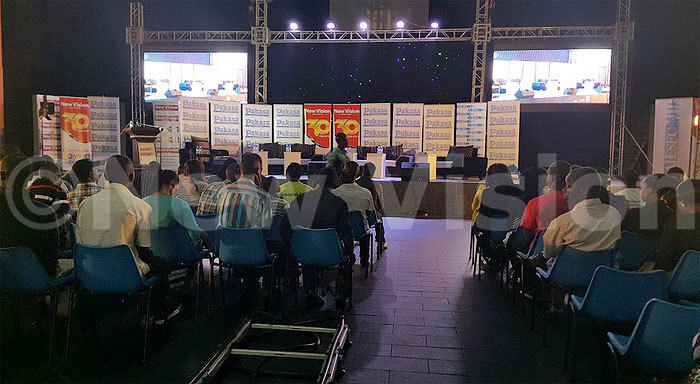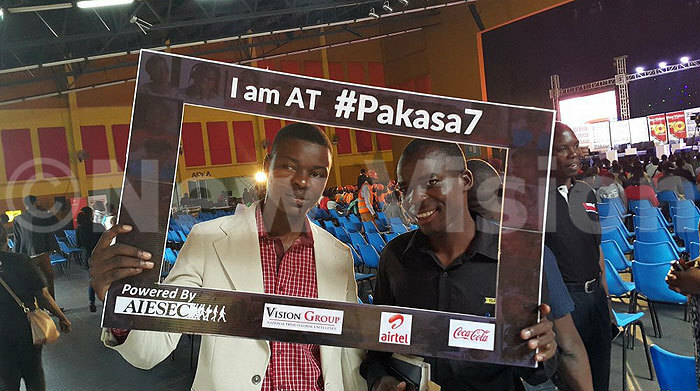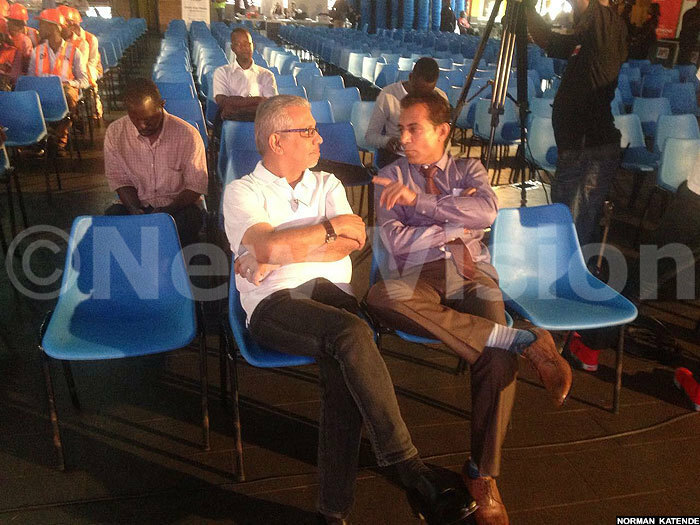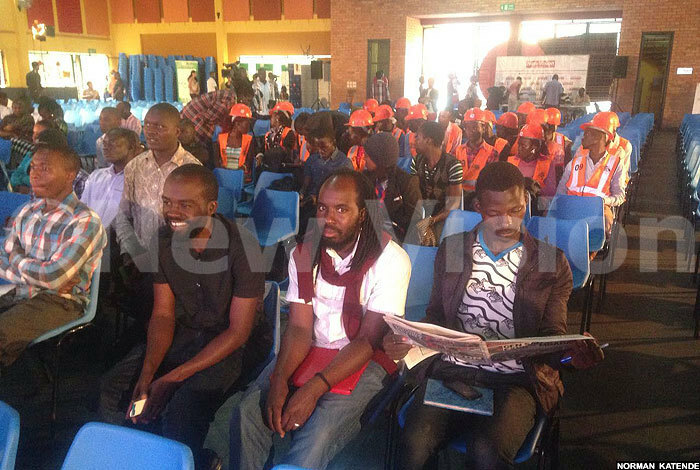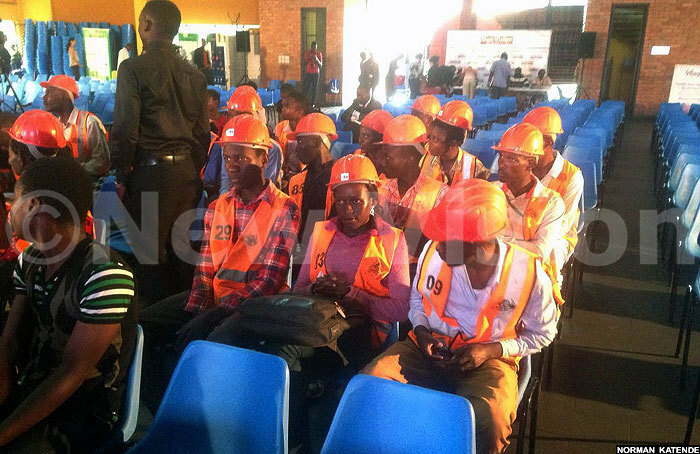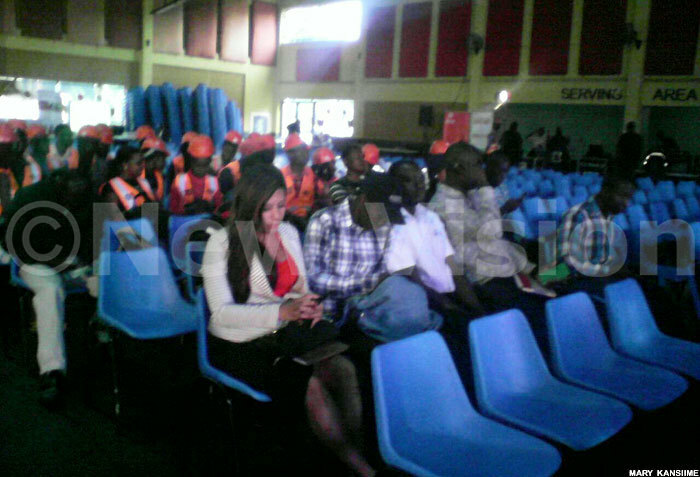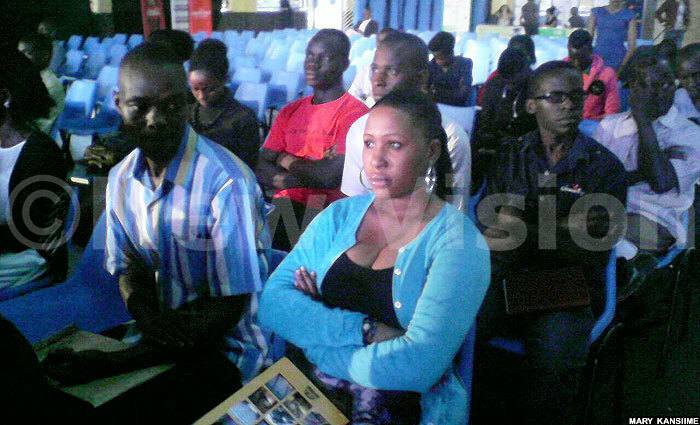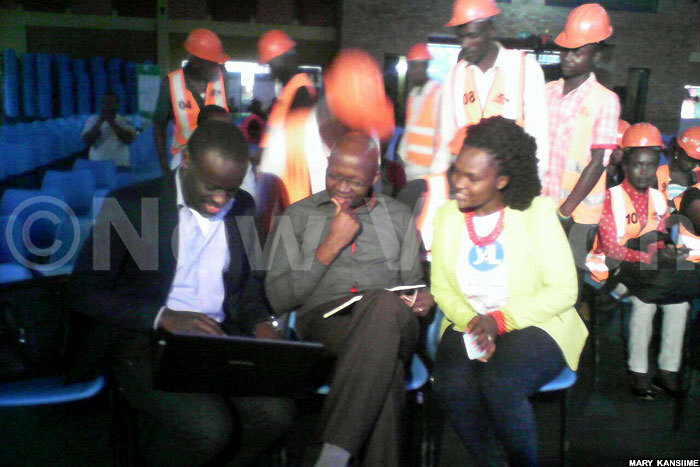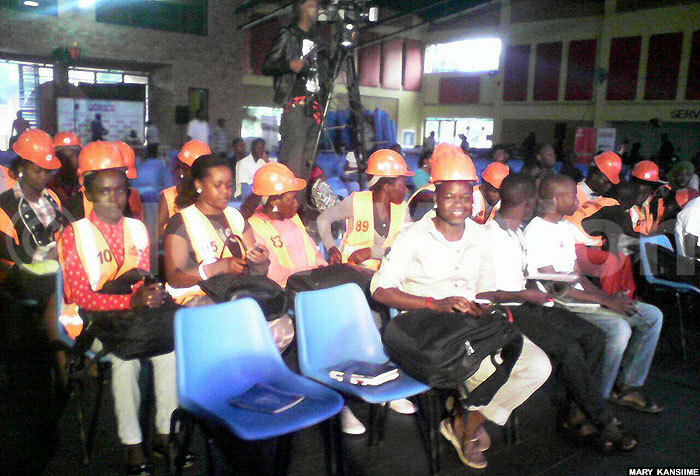As it happened: 7th Pakasa Forum
Apr 09, 2016
The theme of the forum was: 'Service, not profit, as a basis for venturing into business.'

Presented by Joseph Kizza
@joekizza
[SCROLL DOWN FOR UPDATES]
KAMPALA - The 7th edition of the Pakasa Forum took place at the Kampala Parents' School auditorium on Saturday.
This edition rode on the theme: 'Service, not profit, as a basis for venturing into business.'
At the forum, the keynote speaker was Capt (Rtd) Abhay Agarwal while Caleb Owino moderated the event.
The panelists included Dr Barbara Ofwono Buyondo, Erisa Nkoyoyo, Rachael Naijuka and Abubaker Musuuza.
During the forum, the conversation took place online via the hashtag #Pakasa7.
***************
Updates from the forum
|
2.10pm: PAKASA FORUM ENDS
That's it for this 7th edition of the Pakasa Forum at Kampala Parents' School. 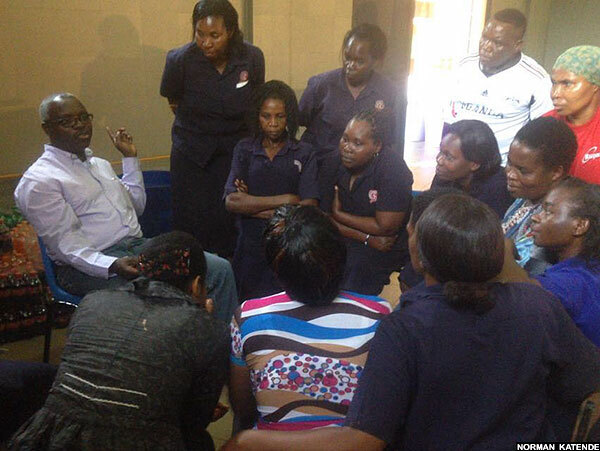 Here, Vision Group CEO Robert Kabushenga shares tips with some Kampala Parents' School staff on starting an investment group
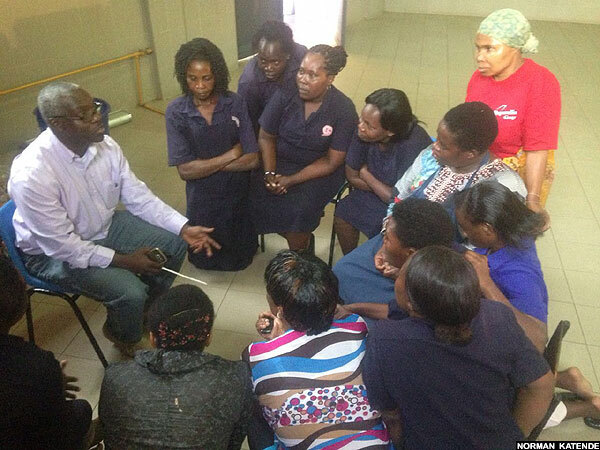
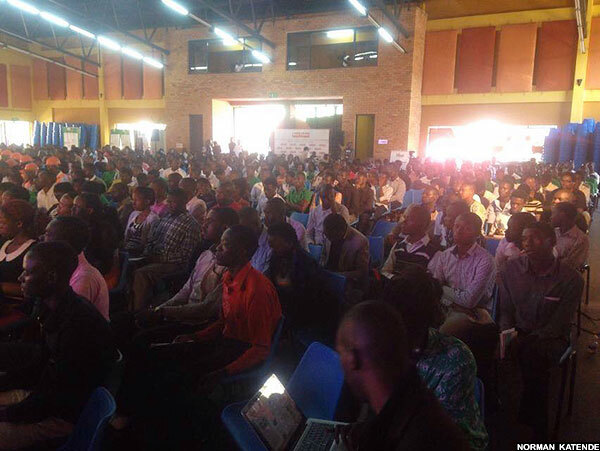 The 7th Pakasa Forum took place inside the KPS auditorium
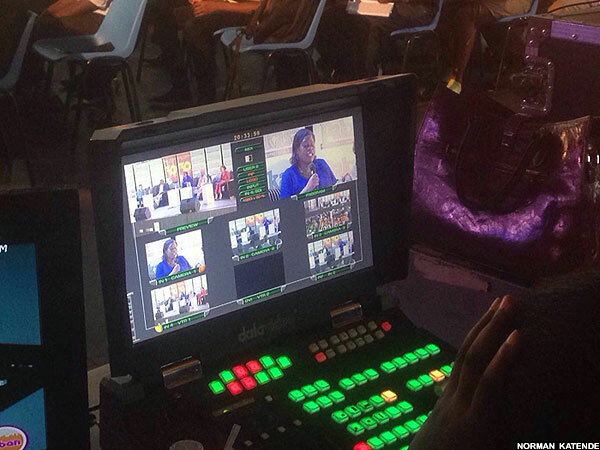 Several media, like Vision Group's Urban TV, relayed the event to their audiences
|
1.50PM: DEALING WITH LOANS AND TAXES
Still pondering that audacious step into the business world? Here's some advice from today's Pakasa speakers . ..
Dr Barbara Ofwono Buyondo: In business, there are always low moments, but there is one thing that can push you through: PASSION
Capt (Rtd) Abhay Agarwal: You must learn to provide the right services instead of giving excuses. Follow demands and you will be successful
Capt (Rtd) Abhay Agarwal: The Internet is a resource that can be used by this generation to discover new ideas
Robert Kabushenga: Learn how to read because the more you read, the more you learn. When you learn to read you learn to observe
Robert Kabushenga: You can't sit down and expect an idea to come running to you. The right time to start a business is now
Racheal Naijuka: Pay attention to detail in your business. Make you business unique.
1.35PM: DEALING WITH LOANS AND TAXES
So do you get a loan to start that dream business? And then, how do you tackle the issue of tax?
To begin with, never take a loan to start a business. That's the advice to young people from the forum's panelist Dr Barbara Ofwono Buyondo.
And along the way, "when you take a loan, stick to the reason you got the loan for," she adds, warning against directing your the funds you have borrowed into other things other than the intended business.
On dealing with taxes, she reminds the youth to always try to seek legal advise from lawyers. But at the very start, "ask yourself who the stakeholders are before starting up your business".
Capt (Rtd) Abhay Agarwal also weighs in on this same issue: "Taxes are your responsibility to pay. We are a highly taxed country and so we need to do something about that."
1.25PM: EDUCATION AND BUSINESS
So does one need education to start up a business?
Panelist Dr. Barbara Buyondo says it is necessary. "You need to get education even when you want to be an entrepreneur. Basic education with a university degree is very vital for you to be at a world class level."
Fellow panelist Erisa Nkoyoyo sees it from a different angle . . .
Education does not run the business, rather it is you who drives it, he says with an emphasis that education is only a tool.
To succeed in your business, he says, you need to use education as a common sense tool.
Meawnwhile, Capt (Rtd) Abhay Agarwal says that educa isn't necessarily the end. Instead, the most important ingredient is logical thinking . . . common sense. And according to him, there is no set formula. "It all depends on when you recognise the opportunity. Then you can overcome the fear."
While the discussion on the importance of education in business goes on, panelist Abubaker Musuuza believes that the most important resource young people have is "your youth years."
"Once lost you can't recover them," he argues.
1.02PM: CAPITAL = BRAIN
Kabushenga: "Capital means brain. God gave all of us a brain. God also gave each of us 24 hours. So it's up to you to do what with your brain in that 24-hour period."
12.55PM: KABUSHENGA: 'THANKS TO YOU ALL'
Vision Group chief executive Robert Kabushenga: "These people [keynote speaker and panelists] are very high achievers . . . and have made time to come here and address you so as to enrich your lives."
"There are other people who are more important that we need to be grateful to. First of all, Kampala Parents' School. They are giving us this place (venue) for free.
"We also thank people like Victoria University that make this very possible.
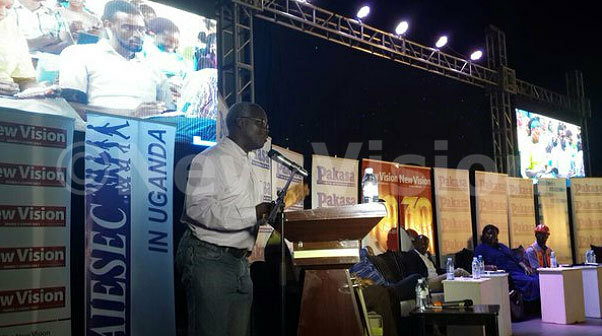
Kabushenga also thanks AIESEC-Uganda for partnering with them, as well as the Vision Group staff who are "making sure this happen".
12.45PM: HOW TO PROTECT AN IDEA AS AN INNOVATOR
Nkoyoyo: Innovators are very smart. I had to get a patent right. No one is allowed to practice that activity without my permission.
Was it easy to get a patent?
"It is not somehow easy," he says, adding that one needs to pursuit legal consultation.
12.42PM: 'PASSION AND PERSISTENCE'
Panelist Rachel Naijuka: For me it was about passion. We are you are passionate about what you are doing, you are persistent even if things are not going the way you want them to along the way."
Panelist Erisa Nkoyoyo: "I believe, I was created to create jobs. Not employing them, but creating jobs for them. I also believe that I am a God-chosen structural engineer.
The biggest problem we have is that we cram. We are good at copying and so we have to change that habit."
12.35PM: 'START CORRUPTION FIGHT FROM HOME'
Dr Barbara Ofwono Buyondo, who is a panelist today, points out that the fight against corruption in our society should start right from home.
"I want to emphasize the issue of values in a family . . . In this generation, the thinking is that everything is at school. However, education begins from home. If we are going to deal with corruption, we have to start from home."
12.25PM: 'FEAR THE FEAR'
Capt (Rtd) Abhay Agarwal: "Fear the fear. If you do not fear the fear, it will ruin you. My motto is I never lose: either I win, or I learn. And when I learn, I do that thing even better the next time."
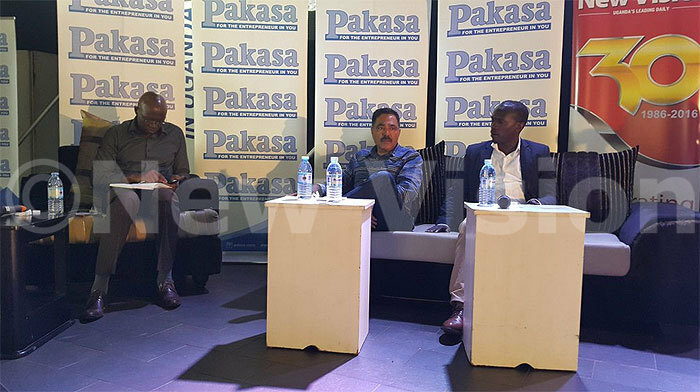
12.20PM: HOW TO OVERCOME FEAR?
So how do you overcome the apprehension of starting up a business?
Dr Buyondo: "I had the idea of beginning a kindergarten. I was a secondary school headteacher. Most of my friends discouraged me. "You are going to be like a school drop-out. You are going to embarrass us," they would tell me, but I remain steadfast and focussed."
Always pray and do not be apprehensive, he says.
Rachael Naijuka on fear: Sometimes you need to tell the positive people about your idea. I think my family were very supportive of my idea.
12.15PM: 'START SMALL'
Dr Barbara Ofwono Buyondo, the principal and founder of Victorious Education Services, is also part of today's panel. She talks of how they started small and that now they have five campuses, three of which they own and the other two they rent.
"Do you have a skill? Are you doing the best to that skill that you have?
"To the youth, if you are nurtured well, you will make a better world."
12.07PM: 'START SMALL'
Panelist Erisa Nkoyoyo: "We have to be courageous and obedient. We have to unite. We have to leave the world better than the way we found it. We must be trustworthy.
"The only way to get happiness is by giving happiness to others, and that is service.
"The most difficult thing is starting, so let us start small and immediately.
Nkoyoyo's brother, who was paying his school fees, forced him to study law. But he says he wanted to follow his heart. He says that life is about choices and so one needs to pursuit their interest.
12.02PM: STARTING WITHOUT CAPITAL
QUESTION: How do you start a business without a capital?
Racheal Naijuka, another panelist of the day, who runs an ushering company, says she started her business at the age of 21 while still at university.
"I believe capital is about the ideas you have in your head.
"I started marketing ushering even before doing anything, something that can show you the zeal or passion that I had.
"I got the first job and told them I was ready to deliver the ladies. They wanted six. I had five ladies and I was the sixth, particularly to get the experience first-hand.
11.55AM: SOLVING A PROBLEM
"How many of you have thought about setting up a phone-charging empire?
"Whatever you do, you must be solving a problem that people have.If you are not solving a problem, your business is going nowhere."
11.45AM: 'HUGE BELIEF'
Abubaker Musuuza, one of today's panelists, starts off by saying how he quit his job in neighbouring Kenya, came back to Uganda with "no money, no saving but with huge belief".
"What drove me into business was that 80 per cent of Ugandans could not access electricity," he says.
"If you cannot solve a problem, your business cannot succeed," Musuuza cautions the youth.
11.32AM: SHORT BREAK
The forum takes a 15-miute break after a Q&A session following Abhay Agarwal's (wearing blue shirt) address.
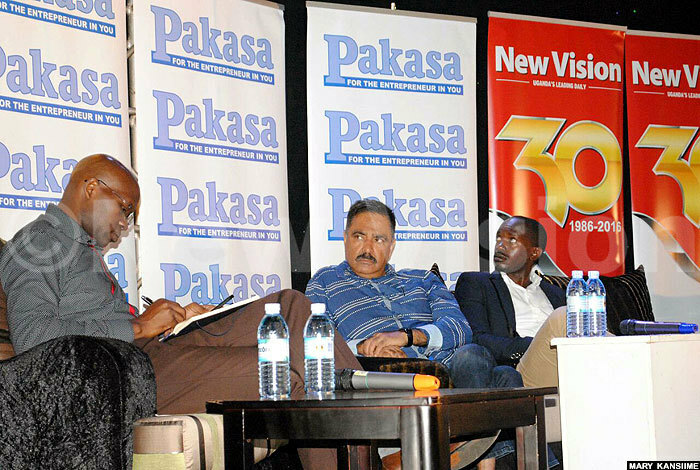
11.20AM: 'WHY BORROW TO GET MARRIED?'
Abhay Agarwal's key highlights quotes:
He says wasting time costs the economy as well as costs businesses precious working hours.
On marriage: "Why do you have to borrow money to get married? When the time comes for you to have to pay back the money, you won't have the money."
He says that you don't have to organize an extravagant wedding, but instead save for your marriage. "Do not be misled".
On religion: "Religion is your conscience. It keeps you clean inside. It reminds you what you have to be."
On corruption, "If you accept corruption, you are equally corrupt. You as youth must decide, do we want a corrupt environment for our children?"
Responsibility: "I want you to be responsible people to your family, to your children, and most importantly, to your nation. Always be proud of your country."
During the Q&A session after his address, the retired captain says: "Do not take loans which you won't be able to pay." What I have seen here is that people take loans and go on to take vacations, fly in first-class . . ."
11.10AM: THE COMMON PROBLEMS
Abhay Agarwal: "Lots of ups and downs in life will always happen. If the graph of the ECG [electrocardiogram] machine goes flat, it means you are dead.
"Life must always have a graph that goes up and down.You need to be strong mentally.
"Another problem in Uganda is time keeping. You youth must improve on this aspect. You must improve on what your elders did not do.
"Don't tell me there was too much of traffic [as an excuse for failing to keep time]."
Another problem points out is on savings. "People [Ugandans] don't like to save for tomorrow. If you make sh100, atleast save sh20 of that. Get into the habit of saving."
On processes and procedures, Agarwal tells the largely young audience: "Shorten your expenses".
He adds: "Don't be a boss, be a leader. A boss will say "you do that! You go there! But a leader will say "Come, let's do this"."
10.55AM: TRUST AND RELATIONSHIP
Abhay Agarwal: "Most important aspects in any business are trust and relationship. I do not know what should come first, but without trust and relationship between you and you clients, you and your counterparts, I do not think you will achieve what you want to.
"One of the problem in this country is that most of the population in Uganda is reactive. You need to change to be more proactive."
10.45AM: 'I AM HOME'
Abhay Agarwal: "You are very flexible, you can be moulded very easily. Just like agriculture, you can be mended, you can be changed, you can be cultivated.
He adds that he loves New Vision for what they are doing, particularly two things: Pakasa project and agriculture coverage, that are helping empower Ugandans in various ways.
He also talks about his love for the Pearl of Africa.
"When I came to Uganda in 1990, what a great place! When we were approaching Entebbe airport, I fell in love with Uganda. And when we landed, I knew, I am home.
People who want to do business in Uganda must be very conscience about so many things," he says.
On the availability of jobs, "government can only do as much. It's we the citizens that should do that [look for jobs]".
10.30AM: 'LEADERS OF TOMORROW'
Capt (Rtd) Abhay Agarwal is invited to address the audience and starts off thus: "What I see here today, the leaders of tomorrow. The future of tomorrow.
"Why do we start with a national anthem?
"We need to change ourselves to start thinking about one nation Uganda.
"Your generation is much more knowledgeable than my generation, but not more intelligent.
"If I wanted knowledge, I had to go to the library, and at that library, I had be driven out at 5pm.
"Uganda has been nominated as the 13th most beautiful country in the world. But what have we done to gain out of this?
10.20AM: 'DISCOVERING AND EMPOWERING'
The president of AIESEC-Uganda Marie Kvendset has just gotten off the mic after addressing the audience. In her speech, she questions whether one man can change the world.
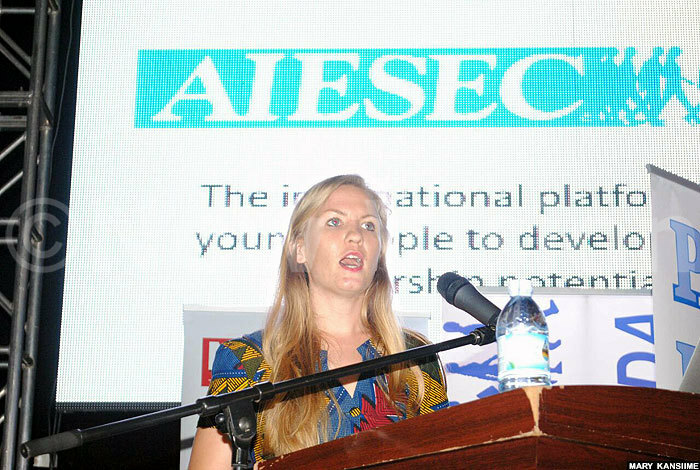
She also says that entrepreneurship is all about young people discovering themselves while empowering others.
EARLIER . . .

